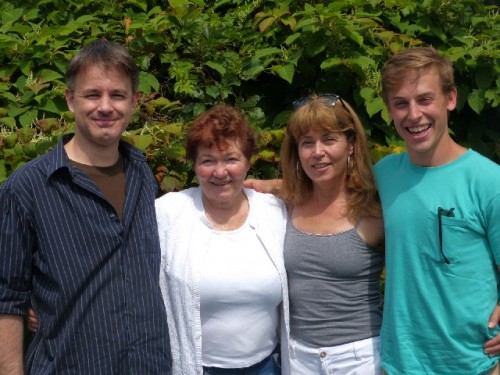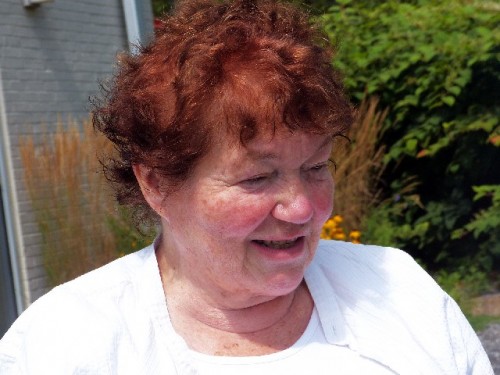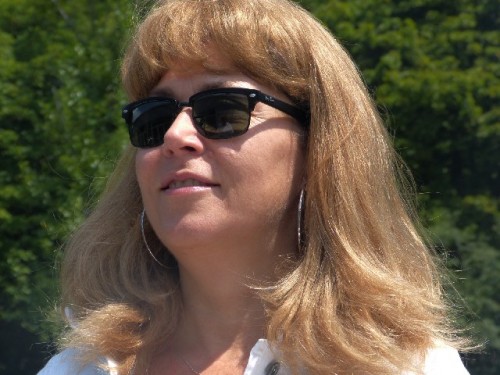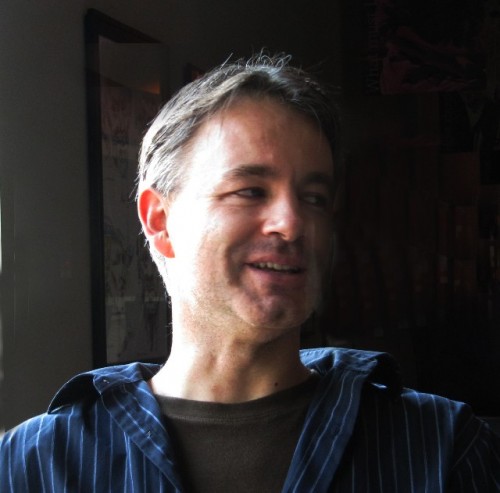Shakespeare & Company Beauty Queens Two
Risk Taking Based on a 35 Year Legacy
By: Charles Giuliano - Sep 02, 2013
Charles Giuliano In doing this play how do the four of you keep it fresh. On the night when we saw it the audience was very involved. They were talking to Edmund (Ray) and urging him not to leave the letter with Mag. There was a very charged relationship between the audience and players.
Tina Packer That’s one of the nicest things about doing this play. I love it Charles when the audience gets that deeply involved.
CG You’re also so clever. When Ray left and you darted back to the chair (to deceive him when he burst in to check on her) we all groaned and said Oh No.
David Sedgwick Animal cunning.
Elizabeth Aspenlieder The thing about a different show every night is that the audience has a huge impact. It was packed on Friday night but I was feeling is there a pulse? It was so quiet. Then Saturday they were much more gregarious. Matthew Penn (the director) all the time tells us to live the circumstances. Reacting off the circumstances. You’re going to react in a different way every night because Tina will deliver a line differently or convey a different emotion or I won’t quite hear something. In my scenes with Pato they can be so fresh and delicate and another night I think, no, I don’t know him. It is different every night. I never know. In the language of this play there are a lot of repetitions and pauses. Sometimes they’re played and sometimes they’re not. The repetition might be played but the pauses may not. You may come in earlier with a line. As Mat says you earn the pause. You’re not just pausing because it says pause. You’re pausing because there’s stuff going on.
CG Elizabeth you’re been with the company now for some time. What does it mean to have a life in theatre? Is there a difference between a profession and an avocation? Does one take a vow to be in the theatre? One could have a job and work in a bank for example to make a living. What’s the difference?
DS I think you have to have something of an avocation to work in theatre. It’s so hard. So brutally difficult to make any kind of financial advance. To have any kind of security. My wife and I are having our first child in January. The people who succeed in theatre, less so in film and television, are the people who just stick it out. You have to have talent but if you’re prepared to stick at it you can get to a level where you’re a little more comfortable. It’s a long, long slog. There’s no guarantee that you’re going to get there even if you do slog it out. So you have to be passionate and really love it. As they tell you in school “If there’s one other thing that will make you happy, other than acting, do that.” Because it will be so much easier. But if acting is the one thing that will make you happy then do that.
TP Very, very few actors make a living just though theatre. Television and film are different. But even people who have good television careers, and I know two or three of them, have a serious career and then it stopped. For the women it's usually at 45. What most people do in the theatre, who are really theatre people, unless they have trust funds, if you don’t have that, which most of us don’t, you start finding a way to teach, to do voice overs, all kinds of other things that will allow you to be a theatre person. Teaching is usually the easiest. Most theatre departments like their faculty to work in the theatre. So you start piecing together a life. If you get married you have to start thinking about health insurance so a lot of wives have steady jobs. If the woman works she can have her husband on her health insurance plan.
CG (Turning to the 23-year-old Edmund Donovan) I hope you’re listening to all of this. (Laughter)
Edmund Donovan I think about this stuff. I’m not totally in a daze. My girlfriend who I have been with for two and a half years is an actress. We do day jobs. We’re not old enough to teach. So we’re waiting on tables and schlepping around New York City.
CG Gail Sheehey wrote a book Passages an idea she stole actually about distinct phases of life. My Friend Tina here and I are at the legacy stage trying to reflect on our careers and contributions.
TP I’m not trying Charles.
CG The play (Beauty Queen of Leenane) seems to define the notion of generations from a senior, Mag, to middle age, Maureen and Pato, to youth, Ray. A lot of people have said that this summer you might well have played Mother Courage (performed by Olympia Dukakis). The cart she drags around is analogous to a life of pulling along Shakespeare & Company.
TP It would have been a good idea. I could have done one a week for her.
CG Talk about dragging around the cart which is S&Co.
TP Right.
CG Like Mother Courage surviving all those wars it is a miracle to look around us and see a vibrant company and campus.
TP I’m not looking back that much I’m still looking forward. There’s so much more left to do. So I really need to pull the cart some more.
CG Even though you’re out of the traces?
TP I’m not completely out of the traces. I’m out of them in running the programming for the summer. I’m a lifelong member of the board of trustees. I have a title which is Founding Artistic Director. We’re going to have to raise the money to get rid of these (decrepit) buildings and build new buildings. Restore that building over there. (Historic Stanford White main building in the center of the campus which long has been abandoned.) I’m very good at this stuff.
CG Do you mean the Stanford White building?
TP That’s the one. We have to rehab it. This summer we had 50 people at Simon’s Rock because we didn’t have the housing for them. We would put the administration and probably have some housing in there.
CG What will that cost?
TP When we first had it assessed the cost was $8 million.
CG It’s a historic building and can’t be torn down.
TP It shouldn’t be torn down. It’s absolutely lovely and very strongly built.
CG Initially I requested to speak with Tina and Elizabeth so I was surprised when all of you came. So let’s focus on the ensemble and what the experience means to you. It’s a beautiful day in the Berkshires. We’re outdoors at the end of the summer. There have to be a lot of benefits to being here beyond “We did the show last night.”
DS It’s wonderful. My wife keeps teasing me saying “It sounds like you’re at theatre camp for adults.” That’s exactly what it’s like. You’ve got all these adults from young sexy ones in their twenties to us older ones. Everyone is doing exactly what they love. We’re here in this beautiful environment. The weather is gorgeous. I live in NY so you’re away from the rat race, the noise and smells.
In this project, I don’t know if I have said this before, but you two (Tina and Elizabeth) have been nothing but welcoming to me and Edmund. I have had no feeling at all during rehearsals or on stage of being intimidated at all by the fact that I’m working with the founding artistic director or someone who has been with the company for almost 20 years. Both of these ladies have treated us a equal partners.
CG It is impressive that Edmund more than holds his own with these heavyweights on stage.
TP They’re expected to. (laughs)
CG In my review. I know that Tina doesn’t read them.
TP I may read this one Charles.
CG I quoted the Albany Times Union saying “My theater-going companion said afterward, ‘Please don't take me to see a play like that ever again.’” I wrote that I see it differently. “For me, however, I see the play as a powerful metaphor on the perennial Irish condition entailing centuries of occupation, war, starvation and repression. Imagine the consequences of having the very language and culture taken from you. Arguably, McDonagh’s ironic play, with its oh so dark and claustrophobic satire and humor, rings as true today as Swift’s A Modest Proposal did for its era.”
Can we talk about the play as a metaphor for Ireland? The centuries of abuse. The whole sequence at the beginning of the play that talks about the use of Gaelic vs. English. To have your language and culture taken away. That’s one of the well know strategies to destroy a people during Colonialism.
TP Have you not seen Women of Will? Where I say the thing is to take the language away from the women. It’s what the oppressor does.
CG Do you buy into the notion that the play is a metaphor for Ireland? Is that a way to interpret the play?
EA In a way yes from everything I’ve read. But also family.
TP Pre the European Union. Everything has changed since Ireland joined the EU. They got rid of the Catholic Church from their constitution. The Church is on the ropes because of all the stuff about sexual abuse by priests. What was going on for centuries, eons, is out in the open. People from Ireland travel all over the world. Leenane is now a tourist thing. They started the University of Limerick. The best theatre company in Ireland is in Galway, The Druid Company. All post EU. Although they went down the odd financial thing. They over leant money. They’re recovering and they learned a huge lesson about the financial crisis.
CG What do you think of this playwright? He was 25 when he wrote this play/
TP He’s very smart.
EA Unbelievable.
CG There has been speculation that S&Co. might do more or his plays.
EA We might.
TP Just not me in them. (laughs)
EA He’s written some wonderful plays. They’re very dark, dark funny plays.
DS There’s a certain segment of the audience that won’t come to a McDonagh play. We were talking about this at the beginning. I’ve had people tell me that they can’t see this show. They’ve read it or seen other McDonagh plays and it’s just too dark and violent. You’re going to have the reverse as well. People who will come because it’s dark.
EA We’ve had people come three times to see this show. We have someone coming to the matinee tomorrow seeing it for the second time. He’s bringing his daughter. Everyone should see this play. So it’s terrific to get diverse viewpoints and reactions from the audience.
CG It’s much to the credit of theatre companies in the Berkshires that they have been willing to present difficult and demanding plays. We were at Barrington Stage on Wednesday for Scott and Hem in the Garden of Allah which intensely deals with alcoholism. Then here for Beauty Queen. On Friday we saw the Martha Graham company at Jacob’s Pillow. Three of the four pieces dealt with mourning, torture and terrorism, and ritual sacrifices.
DS Berkshire Theatre Group did Extremities.
CG By the time Sunday came around I said to Astrid “It’s been a tough week.” It speaks well for the Berkshires. What does that say about your audiences? This ain’t summer stock.
EA It’s not.
TP When I first arrived here the BTF (Berkshire Theatre Festival now Berkshire Theatre Group) did lighter fare. There was Lynn doing the Lenox Arts Center. It was more abstract modern stuff. But there wasn’t half the theatre there is now. People started gathering here because we were not going to do summer stock. Because we were going to do Shakespeare or do new playwrights and things like that. People left the Hamptons and came here. They are people who are really interested in thinking about the meaning of life if I can put it that way. They want to live examined lives. That’s what the theatre does. Gradually people who found their way to the Berkshires are people who want to live examined lives.
We must have the most active liberal Jewish community in the whole of the United States. They’re extraordinary. (emphasis) They’re extraordinary. They support theatre.
DS People come here from other parts of the U.S. When we were at Canyon Ranch we met a couple who live in Texas. They come here partially to escape the heat. Every year they come to the Berkshires. In a week or two they see as much theatre as they possibly can.
EA It is a testament to the types of plays that we do because our theatres are full. Knock on wood.
CG You’ve had good audiences.
EA We’re had a terrific summer.
TP (To Tina) Although you no longer plan the season you must be looking over Tony’s (Simotes) shoulder and wonder what he’s doing. This summer we had the rarely produced Richard II as well as an early comedy Love’s Labour’s Lost. Heroes a Stoppardesque evening isn’t easy. Beauty Queen and Mother Courage are tough plays.
EA Risky.
CG It seems like S&Co stuck its neck out over and over and over again. Ending the season with this horrific experience of torturing an audience.
TP But it does say something though. It’s obviously not what I’m doing but what Tony is doing.
CG It’s a risky program.
TP It is a risky program.
CG Now the company will do the History Plays which most audiences have never heard of.
DS Lots of people have heard of them.
CG It’s not the familiar plays Lear, Hamlet, Macbeth, Romeo and Juliet.
TP That’s why they did Richard II this year because it’s the beginning of the History cycle.
CG (To DS) Was that a factor in coming here this summer. The notion that this is a company that takes chances?
DS Do you want to speak to that Edmund?
ED I’m not particularly familiar with the programming in decades past. But knowing what Allyn Burrows has done here. I have never been to the theatre here before coming to work here. So I don’t have much context. But I am the audience for the Histories. I studied it and I’m trained in it. So I have the patience for it. I may be biased. The War of the Roses isn’t that far fetched a concept for me to get interested in. Perhaps I’m so early in my career that it’s hard to place myself in that leadership position and really be critical of the decisions being made.
CG Talking with fellow critics, some of whom have been covering theatre for decades, they said “I have seen Richard II perhaps twice in my life.” We saw it in London at the Globe.
TP That was the Mark Rylance production (2003).
CG So I did in fact see it once before here this summer. So that’s twice in a lifetime.
EA I’ve been here 18 years and this company has never done it.
TP We did it way back in the Stables (at The Mount).
DS I have an answer that addresses both your points. For me, as an actor, I’m older but in the beginnings of my career in the States. I came here in my mid thirties. So I’m at a different point in my career. When I found out that I have this audience opportunity through Nicole there were two things that made me leap at it. The first was S&Co. and the second was the play. Even though I didn’t know much about the company its reputation preceded it. I knew it was a place that I should try to work at if they would have me. That would be a feather in my cap.
I think that addresses your question about the season. If you’ve been running a company for 35 years you build up a certain amount of good will with your audience. They trust you. From time to time the company can say here we go we’re going to do something interesting. We’ll show you plays like Heroes that people never do. It was a wonderful production. It’s two sides of the same coin. Actors coming here know that they will be dealt with professionally. Something interesting will happen not matter what the project is. For the audience, ok, maybe I haven’t heard of Richard II and maybe I know other Tom Stoppard plays but not this one. They’re going to take a risk because they’ve had so many positive experiences in the past.
CG Coming back to the theme of family. The company is now a big family and are there enough good parts for all the members? Rocco’s (Sisto) number came up this year with the chance to play Richard. What’s happening with Nigel (Gore Tina’s partner in the tour of Women of Will)?
TP He and I were in Colorado the year before last. They offered him Macbeth, and Bottom which he couldn’t turn down and S&Co. couldn’t match that offer. He’s doing well.
CG How do you feel about members leaving to work with other companies?
TP It’s great because they take the aesthetic with them. They learn other things when they’re out there and they bring them back again. There are something like 14 artistic directors Charles of people who started here. Allyn Burrows is a case in point. Lisa Volpe who directed Love’s Labour’s Lost started the LA Women’s Shakespeare Company. Tim Douglas just finished being an artistic director in Chicago where we have another artistic director. They take what we have and spread it further.






